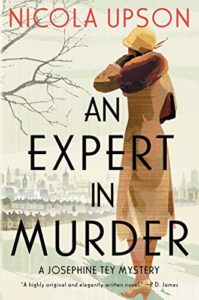
 Warning: Nicola Upson will mess with your mind, and make you like it.
Warning: Nicola Upson will mess with your mind, and make you like it.
This brain-bending story forces you to question reality, but not because of the mystery plot. An Expert in Murder is structured as a classic whodunnit. No, it’s Upson’s choice of character and setting that will send you into a Blair-Witch style guessing game of “did that really happen?”
Upson’s main character is the brilliant real-life mystery writer, Josephine Tey. (If you’ve never read Tey, go get Daughter of Time or Brat Farrar immediately.) Except that “Josephine Tey” wasn’t a real person, but the pen name of Elizabeth MacKintosh, who also wrote as Gordon Daviot. Upson’s story centers around the production of Tey’s play Richard of Bordeaux, which is a real play written by MacKintosh under the Daviot pseudonym. Of course, the real West End run of Richard of Bordeaux was not littered with scandal, suicide, blackmail, and murder. OR WAS IT? (Cue ominous music.)
The wonderfully twisty premise alone doesn’t do justice to the pleasure of this book. An Expert in Murder is a thoughtful, lyrical read. We see the story primarily from Josephine’s point of view, and Upson has created a deeply empathetic and insightful character, with a rich back story and complex relationships. One such relationship is with Detective Inspector Archie Penrose, who is presented as the real-life model for Josephine’s fictional detective, Alan Grant (More brain-bending. I did warn you.) Josephine and Archie have a long emotional history together, which both affects and is irreversibly altered by the events of the story. We’re certainly coming into the middle of their almost-but-not-quite dance between friendship and love. Upson portrays it so vividly and handles the exposition so skillfully, that I’m intrigued without feeling like I’m missing anything, or that the characters are rehashing information for those who came in late.
The topic of relationships brings up several interesting points. With so many complex discussions happening right now around the representation of LBGTQ characters in mainstream culture, I must note Upson’s choice to highlight two different same-sex relationships in An Expert in Murder. Within the story, it’s pointed out that a great driver of the play Richard of Bordeaux‘s popularity is the onstage chemistry between the romantic leads, John Terry and Lydia Beaumont. Many fans are convinced the two must be real-life lovers, but in fact both actors are gay. (What basis this may have in real-world history, I do not know.) Both John and Lydia are in committed same-sex relationships, and I was struck by the fact that both these relationships are portrayed with exactly the same challenges, flaws, affection, and nuance as any functioning marriage. That probably shouldn’t be surprising or unusual. Compared to the vintage literature of the 1930s and even most popular culture today, it certainly is.
Which leads to a side question for me – it makes perfect sense that the theater crowd accepts John and Lydia without reservation. It did puzzle me though, that of all the characters from various backgrounds and milieux, only one had any negative or biased reaction. John’s vulnerability to blackmail eventually becomes a plot point, but the incident is triggered by an open display of affection between John and his partner on a street corner. Lydia and her partner also joke about “scandalizing” landladies on vacation. Perhaps it’s the difference between US and UK culture, but the characters’ casualness about their status doesn’t match the first-person accounts I’ve read or been told by friends about the psychological burden of being closeted 10 or 15 years ago (and in some areas even today). Was England really that progressive in 1934? The question certainly didn’t spoil the story, but it did briefly kick me outside the narrative flow.
In any mystery, the reverse/reveal is a crucial point, and getting it just right is hard. Really, really hard.
Upson uses her gift for character development to good advantage here, as it’s Josephine’s writerly musings, rather than a concrete clue, that leads us to the solution. She builds the tension of “It must be…it can’t be…” nicely, and grounds the final twist in a shattering personal betrayal.
Unfortunately, the climactic scene of confrontation and revelation devolves into extended explaining and exhorting. At one point I flashed to the moment in The Incredibles, when the villain suddenly goes meta: “You sly dog, you got me monologuing!” It’s a devilishly tricky business, and I certainly wouldn’t claim to do better, but those were some long, long speeches.
Fortunately, the denoument brings us back around to a high-stakes moment in Archie and Josephine’s relationship. Here Upson’s characterizations really shine, as these two struggle to deal honorably with their baggage and with each other. Upson shuns the temptation to mushiness or cliché and leaves their situation unresolved, but with unmistakable and satisfying hope.
An Expert in Murder is highly recommended. Devotees of the brisk and fluffy contemporary cozy may find it slow going, but historical fiction and classic mystery fans are in for a solid all-around pleasure to read.
By request, I include a “squick factor” rating on reviews, to give tenderhearted readers a heads-up on graphic or disturbing material.
The horrors of World War I and the victims’ manners of death are clear, but the emphasis is always on the characters’ reactions. It’s emotionally mature material, but in no way gruesome. Squick factor: Nil.
Squick Factor Range:
0 – Nil.
1 – Meh.
2 – Kinda.
3 – Oh yah, you betcha.
4 – GAAAHHH! Nuke it from space!
My newsletter subscribers receive a new review and links to free books every month! You can sign up by clicking right here:
[popup_trigger id= “free-download”]
SIGN UP on my VIP Readers List
[/popup_trigger]